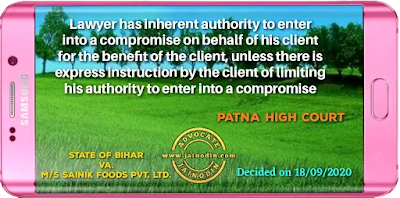Having regard to the law laid down by the High Courts of this country, it can be clearly deduced that the various High Courts are of the unanimous view that even in cases where there is no express authorization to enter into a compromise under the inherent authority impliedly given to the counsel, he has power to enter into a compromise on behalf of his client for the benefit of the client, especially in absence of any express instruction by the client to his counsel, limiting his authority to enter into a compromise or give reason.[Para No.8]
A bare perusal of the review petitions, filed by the Department of Mines and Geology, Government of Bihar, Patna, would show that there is no pleading to the effect that the learned Special P.P., Mines was expressly barred from giving his consent to orders being passed by the Hon'ble Patna High Court, keeping in mind the interest of the Department. It is a well settled law that the power to give consent or enter into a compromise in a particular given case is inherent in the position of an advocate in India and such power is deemed to exist because its existence is necessary to effectuate the relations between advocate and client, to make possible the duties imposed upon the advocate by his acceptance of the cause of his client. The advocate is to conduct the cause of his client to the best of his skills & understanding. He must, in the interest of his client, be in the position, hour by hour, almost minute by minute, to advance this argument, to withdraw that; he must make the final decision whether evidence is to be given or not on any question of fact; skill in advocacy is largely the result of discrimination.[Para No.11]
It is equally a well settled law that a compromise settlement made in good faith by a counsel, when sanctioned by the Court in its order, is binding upon the client, as is also deducible from the various Judgments referred to herein above in paragraph No. 7 of this Judgment. Therefore, this Court is of the view that even in cases where there is no express authorization to enter into a compromise under the inherent authority impliedly given to the counsel, he has power to enter into a compromise on behalf of his client for the benefit of the client, especially in absence of any express instruction by the client to his counsel, limiting his authority to enter into a compromise or give reason. Consequently, it is held that the review petitioners-State authorities are bound by the orders passed by the Court on the basis of consent / compromise.[Para No.12]
Patna High Court
The State Of Bihar
Vs.
M/S Sainik Foods Pvt. Ltd.
Decided on 18/09/2020

